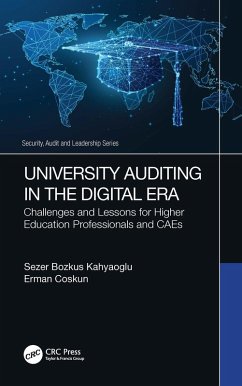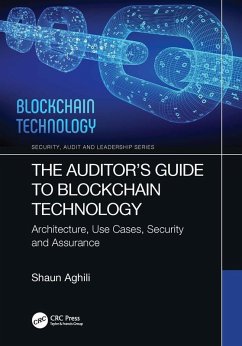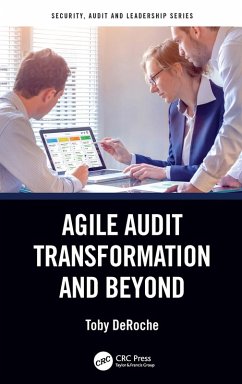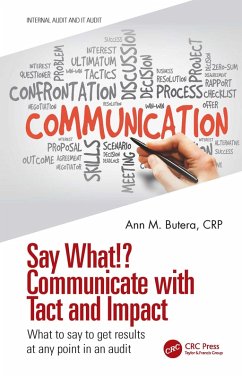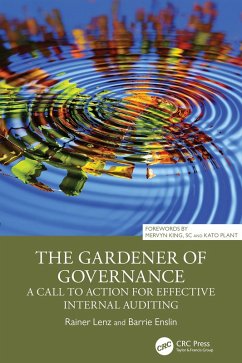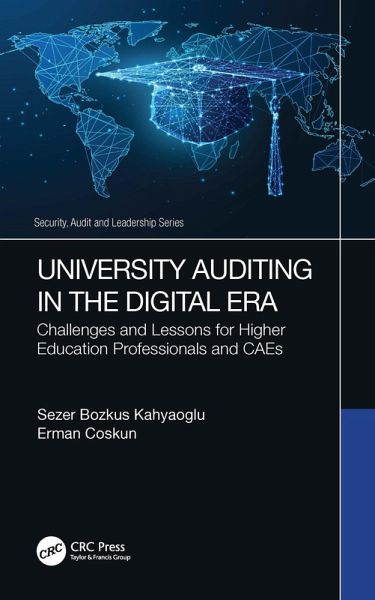
University Auditing in the Digital Era (eBook, PDF)
Challenges and Lessons for Higher Education Professionals and CAEs
Versandkostenfrei!
Sofort per Download lieferbar
44,95 €
inkl. MwSt.
Weitere Ausgaben:

PAYBACK Punkte
22 °P sammeln!
This book explores how digital transformation is reshaping the manner in which higher education sectors emerge, work, and evolve and how auditors should respond to this challenging and risky digital audit universe in transforming the higher education system. It serves to help professionals to understand the reality of performing the Chief Audit Executive (CAE) role in today's evolving business economy, specifically in the higher education sector. It compares and contrasts the stated IIA standards with the challenges and realities auditors may face and provides alternative scenarios to gaining ...
This book explores how digital transformation is reshaping the manner in which higher education sectors emerge, work, and evolve and how auditors should respond to this challenging and risky digital audit universe in transforming the higher education system. It serves to help professionals to understand the reality of performing the Chief Audit Executive (CAE) role in today's evolving business economy, specifically in the higher education sector. It compares and contrasts the stated IIA standards with the challenges and realities auditors may face and provides alternative scenarios to gaining a "seat at the table."
This book also provides insight into critical lessons learned when executing the CAE role relevant for digitally transforming universities. The main purpose of this study is to rethink the audit culture in the digital era and reveal the key characteristics that are open for improvement so that digitally transforming universities can be audited according to the higher education standards with a digitally supported value-added audit approach. Based on this approach, the audit culture is reassessed considering the digital university conceptual framework and business model. There are two main points to consider for the digital university work environment: traceability and auditability. In this respect, policy recommendations are made for best practices to achieve value-added digital audits in transforming universities.
The book has been written from both the reality and academic perspectives of two experienced authors. Sezer is a past CAE, CEO, and long-term senior internal auditor who has worked in the internal audit role for various listed companies, financial institutions, and government entities. Erman has extensive information technology and university accreditation knowledge in the global higher education sector. This brings a blend of value-added approaches to the readers and speaks to issues about understanding and dealing with audit culture and business evolution in digitally transforming organizations along with the requirements for upholding IIA standards.
Geared toward the experienced or new CAE, University Auditing in the Digital Era: Challenges and Lessons for Higher Education Professionals and CAEs can be a tool for all auditors to understand some of the challenges, issues, and potential alternative solutions when executing the role of university auditing. In addition, it can be a valuable reference for university administrators and CIOs, as well as academics and all stakeholders related to the higher education sector.
This book also provides insight into critical lessons learned when executing the CAE role relevant for digitally transforming universities. The main purpose of this study is to rethink the audit culture in the digital era and reveal the key characteristics that are open for improvement so that digitally transforming universities can be audited according to the higher education standards with a digitally supported value-added audit approach. Based on this approach, the audit culture is reassessed considering the digital university conceptual framework and business model. There are two main points to consider for the digital university work environment: traceability and auditability. In this respect, policy recommendations are made for best practices to achieve value-added digital audits in transforming universities.
The book has been written from both the reality and academic perspectives of two experienced authors. Sezer is a past CAE, CEO, and long-term senior internal auditor who has worked in the internal audit role for various listed companies, financial institutions, and government entities. Erman has extensive information technology and university accreditation knowledge in the global higher education sector. This brings a blend of value-added approaches to the readers and speaks to issues about understanding and dealing with audit culture and business evolution in digitally transforming organizations along with the requirements for upholding IIA standards.
Geared toward the experienced or new CAE, University Auditing in the Digital Era: Challenges and Lessons for Higher Education Professionals and CAEs can be a tool for all auditors to understand some of the challenges, issues, and potential alternative solutions when executing the role of university auditing. In addition, it can be a valuable reference for university administrators and CIOs, as well as academics and all stakeholders related to the higher education sector.
Dieser Download kann aus rechtlichen Gründen nur mit Rechnungsadresse in A, B, BG, CY, CZ, D, DK, EW, E, FIN, F, GR, HR, H, IRL, I, LT, L, LR, M, NL, PL, P, R, S, SLO, SK ausgeliefert werden.




